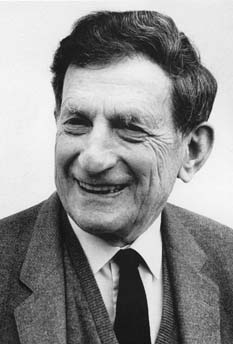Henri Bortoft is a former student of renown quantum
physicist David Bohm. He may also be an Anthroposophist. At the very least, he
is some kind of "fellow traveller", since his book is published by an
Anthroposophical press. Anthroposophy is a spiritual or religious movement,
founded about a century ago by Rudolf Steiner. While Bortoft's mentor Bohm
wasn't a follower of Steiner, it's nevertheless interesting to note that he did
have spiritual interests. Bohm had contacts with Jiddu Krishnamurti. On a funnier
note, I suspect that the character Kenneth Flume in Owen Barfield's
"Unancestral voice" might be based on Bortoft. Barfield, of course,
was an Anthroposophist of long standing.
"The Wholeness of Nature: Goethe's Way of Science" is a difficult
book dealing with epistemology, ontology and the philosophy of science. It
contains few direct references to Rudolf Steiner. Instead, Bortoft attempts to
prove his case by way of Gadamer, Heidegger, Husserl, Cassirer and Bergson.
However, many of the lesser known authors quoted are probably Anthroposophists.
And yes, he mentions both Bohm and Barfield.
Nominally, the book is an analysis of Goethe's view of science. However, I'm
not sure if Bortoft's exegesis of the famous German polymath stand up to closer
scrutiny. Indeed, Bortoft admits at several points that his interpretation is
unusual. My guess is that the author sees Goethe through the interpretive lens
of Steiner, in effect turning the poet into a kind of early Anthroposophist.
For instance, it seems that "Goethean science" is really a meditation
technique which makes it possible to see the One in the many, something Bortoft
dubs "multiplicity in unity". This entirely new way of seeing
phenomena is possible only if a special organ of perception is developed within
our minds, which once again suggests meditation or even mysticism of some kind.
I admit that I found the book hard to follow. It's not hard to read, quite the
contrary. However, the ideas are so unusual and strange that "The
Wholeness of Nature" becomes difficult anyway. A large part of the book
sounds like a defence of quasi-sollipsist postmodernism, where no objective
truths "out there" exists and everything is a matter of perspective.
I admit that I find this kind of philosophy extremely annoying! Despite the
"pomo" angle, the author does seem to regard a ever-changing, dynamic
pantheist world-soul as an objective reality, independent of our perceptions.
However, the phenomena of the objective world need to be perceived by a human
consciousness to become fully themselves. The phenomena of the natural world
are in some sense incomplete without a human participatory consciousness which
blends subject and object in the act of perceiving them.
This does sound weirdly anthropocentric. While its true that colours or sounds
need a consciousness to be perceived, which raises all kinds of intriguing
questions if you believe in God or the World-Soul, why do phenomena need a
specifically *human* consciousness to be fulfilled? Why not a bat? Or an angel
or elemental, since Steiner believed in such? Of course, this question would be
meaningless to orthodox Anthroposophists, who apparently regard a kind of
spiritualized human as the progenitor of all living organisms.
"The Wholeness of Nature" also discusses archetypes, Platonic forms
and universals. There is an extensive footnote criticizing Darwinian evolution.
The author rejects Platonizing or proto-Darwinist interpretations of Goethe's
ideas about archetypal plants or leafs. His own interpretation is difficult to
follow, but apparently there is no reality "behind" the phenomena.
Rather, the world-soul necessarily appears as a multiplicity. Only with the aid
of participatory consciousness can we realize that every single phenomenon is
wholly an expression of the One, in the same way as every single piece of a
hologram contains the entire hologram.
Bortoft discusses the plant archetype at some length, claiming that every
species of plant is an expression of a primordial plant, which is "its own
explanation" and "cannot be otherwise". This suggests some kind
of immutability (at least on the spiritual level). It obviously goes against
the grain of Darwinian evolution, which explains all plants
"mechanically", by way of mutation and natural selection. The
Anthroposophical explanations are bound to be much more esoteric and nebulous,
and one sometimes get the impression that there really isn't an explanation at
all. The spirit bloweth where it listeth...and creates buttercups and water
lilies as it goes along. There seems to be a tension in Bortoft's reasoning
between a creative evolution of the spirit, and a more static perspective where
preordained organisms simply pop up into existence according to never-changing
archetypal patterns. (He does admit that "mechanical" causes enter as
secondary causes once the plants have manifested themselves.)
It's not clear to me how many archetypes there really are. Goethe's Urpflänze
is the One in relation to all plants. There are also mammalian, reptilian or
human archetypes. Finally, there seems to be a One that is universal. Is there
a hierarchical pattern within the One? If so, how static is the hierarchy? How
can it be creative evolution if there is a cosmic pattern into which all
organisms on our little planet fall rather neatly?
Somehow, I never understood the *real*point of "The Wholeness of
Nature". It obviously isn't a simple discussion about some forgotten
aspect of Johann Wolfgang von Goethe's Weltanschauung (or herbarium). Perhaps
it could be seen as a preparatio evangelica Anthroposophica? Although its
quasi-pomo perspectivism really irritated me (not to mention the constant
references to Gadamer's hermeneutics - how I hate that little word!), I admit
that this is a strangely interesting tome, after a fashion.
For that reason, I give it four stars. I can only hope that you may understand
it better than I did...
.JPG/242px-Taxidermy_mounted_tiger_17_June_2021_(10).JPG)


